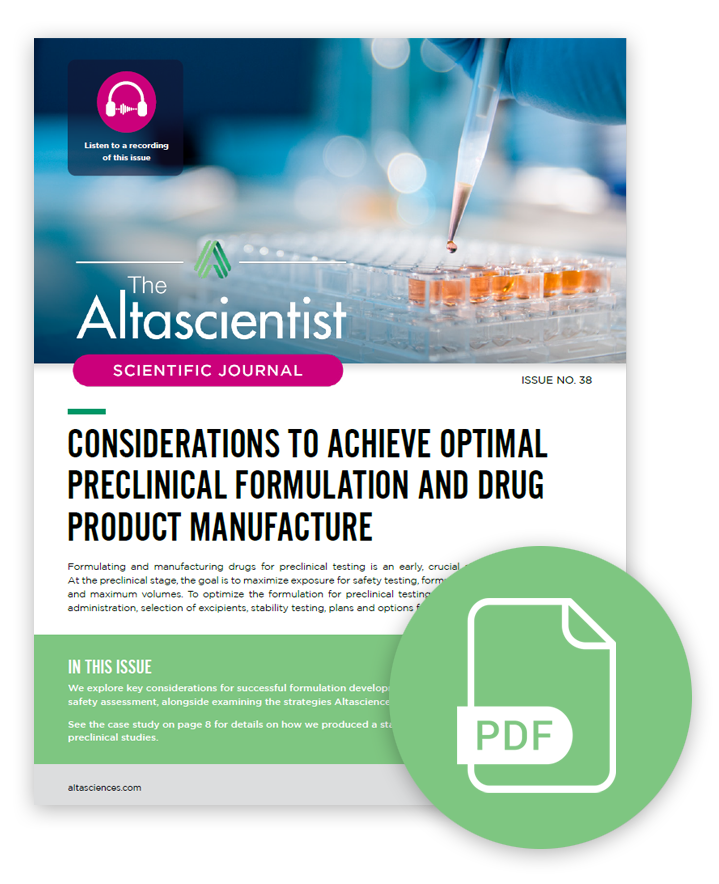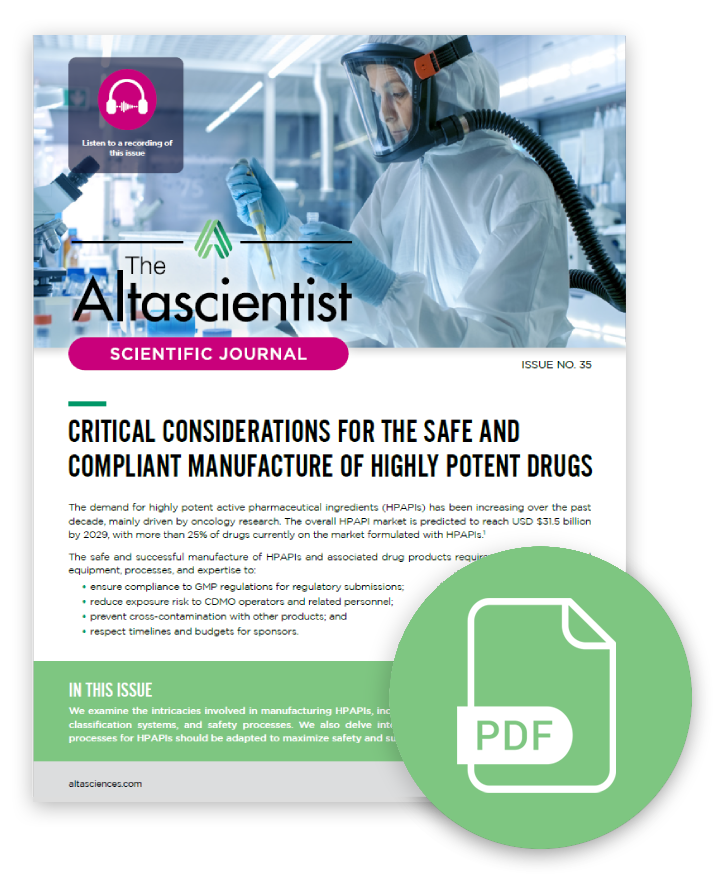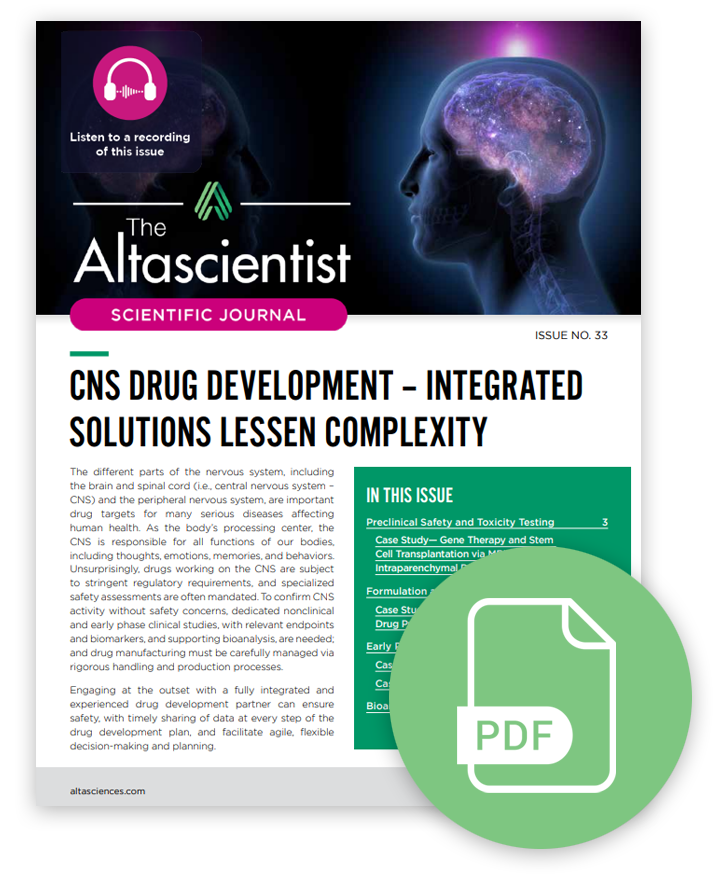Manufacturing and Analytical Services
ISSUE NO. 38 — Achieving Optimal Preclinical Formulation and Drug Product Manufacture

Formulating and manufacturing drugs for preclinical testing is an early—and necessary—step towards pushing your molecule through to human clinical trials. At the preclinical stage, the goal is to maximize exposure for safety testing, formulating the limits of solubility and maximum volume. To optimize the formulation for preclinical testing, it’s important to consider the following for informed decision-making regarding feasibility, scale-up, and the future success of your program: route of administration, excipients selection, stability testing, scale-up plans and options, and contingency plans.
Issue 38 of The Altascientist explores the key considerations for successful formulation development and manufacture for safety assessment, alongside examining the strategies Altasciences employs to support you in planning your program.
Preclinical manufacturing involves various sub-processes, all of which are critical in overall drug development. And in this issue, you will discover these sub-processes in detail, including:
- formulation development
- manufacturing process development
- scale-up
- process validation
- analytical method development and validation
- quality assurance and control
- stability studies
- regulatory compliance
- risk management
Also included is a case study about how Altasciences helped a client get their new API through the preclinical development phase with a robust formulation at the maximum potency.
COMMON ROUTES OF ADMINISTRATION AND DOSAGE FORMS
The common route of administration for preclinical testing is oral, due to its translatability to patients, typically liquid formulations that can be adjusted easily based on the weight of the selected test systems. If suitable exposure is not possible via the gastrointestinal tract, then intravenous or subcutaneous administration may be possible using solutions. For dermal studies, creams or gels are ideal since they remain at the site of administration for the intended duration, to generate adequate exposure to the formulation.
Whatever the route of administration, determining the maximum concentrations and the maximum volumes that can be dosed in the test species provides early data regarding the feasibility of achieving appropriate doses for clinical trials. Ensuring that the selected formulation can be scaled up throughout development is a key component of formulation planning.
Many other dosage forms are possible throughout the development process, including nanomilled suspensions, solutions, creams, gels, powders, tablets, liquid- and powder-filled capsules, over-encapsulated capsules, and injectables.
Explore all issues of The Altascientist in our Resource Center. And don’t forget to subscribe to The Altascientist: Audiobooks on Spotify, Apple Podcasts, or wherever you get your audio content.
The Year in Review 2023

Top 10 Life Science Resources - October 2023
There’s a lot of life science content out there, which is why we’ve curated a selection of our expert insights, tips, case studies, and scientific and regulatory information for you. Catch up on what you may have missed below!
Choosing the Optimal Dosage Form for Your Molecule
Manufacturing With a Highly Potent API for an Ophthalmic Indication
Altasciences' Facilities: Moving in Unison
Embarking on a Career in Drug Development
Getting to the Heart of Science with Amber malloy

ISSUE NO. 35 — Critical Considerations for the Safe and Compliant Manufacture of Highly Potent Drugs

In recent years, advancements in oncological research have fueled a surge in demand for highly potent active pharmaceutical ingredients (HPAPIs). So much so that the HPAPI market is estimated to reach USD 31.5 billion by 2029.
Thousands of HPAPIs are currently in development that promise lower dose requirements, enhanced efficacy, improved patient compliance, and fewer side effects.
Manufacturing these drug products involves expert specialization and careful consideration to ensure that GMP regulations for drug submissions are met, the risk of exposure for CDMO-related personnel is reduced, and every effort is made to prevent cross-contamination.
In Issue 35 of The Altascientist, we explore the intricacies and critical considerations for the safe and compliant manufacture of highly potent drugs, in particular HPAPIs, which include:
- categorization of HPAPI potency;
- classification of exposure potential;
- appropriate containment strategies;
- engineering controls and waste management practices; and
- global regulatory requirements.
What Defines High Potency for an API?
The classification for what constitutes high potency for an API varies depending on the source. However, it is generally defined by one or more of the following: biological activity at approximately 150 μg/kg of body weight or below in humans; hormones; certain steroids; novel compounds with unknown toxicity or potency including biological activity; occupational exposure limits (OELs) at or below 10 μg/m of air as an eight-hour time-weighted average; high selectivity and/or with and potential to cause cancer, mutations, development effects, or reproductive toxicity at low doses. New APIs undergo robust evaluation to determine their classification level for safe handling procedures and clearance limits.
Explore all issues of The Altascientist in our Resource Center. And don’t forget to subscribe to The Altascientist: Audiobooks on Spotify, Apple Podcasts, or wherever you get your audio content.
Top 5 Ways Integrated Drug Development Solutions Save You Time and Money
Since 2004, the average cost of bringing a new drug to market has increased from $800 million to about $2.6 billion, without, for the most part, shorter development time
ISSUE NO. 33 — End-to-End CNS Drug Development Solutions

In Issue 33 of The Altascientist, we explore how a comprehensive, end-to-end integrated approach to drug development for central nervous system (CNS) therapeutics can take you seamlessly from lead candidate selection to market.
Engaging at the outset with a fully integrated and experienced drug development partner can ensure safety, with timely data sharing at every step of the drug development plan, and facilitate agile, flexible decision-making and planning.
With detailed case studies, study considerations, and more, this Issue covers:
- preclinical safety and toxicity testing,
- formulation and manufacturing,
- early-phase clinical trials, and
- bioanalysis.
the cns drug development landscape
The different parts of the nervous system, including the brain and spinal cord (i.e., central nervous system – CNS) and the peripheral nervous system, are important drug targets for many serious diseases affecting human health. As the body’s processing center, the CNS is responsible for all functions of our bodies, including thoughts, emotions, memories, and behaviors.
According to Fortune Business Insights, the global CNS market is projected to grow from $89.02 billion in 2021 to $166.53 billion in 2028, at a compound annual growth rate (CAGR) of 9.4%. This growth is driven primarily by the rising demand for age-related neurodegenerative treatments due to the increasing global population over the age of 65, the growing potential of psychedelic therapies in treating conditions like PTSD and psychosis, and CNS-active drugs proving increasingly effective across various areas, such as acute and chronic pain, brain diseases, and autoimmune disorders.
“The successful delivery of drugs targeting the treatment of CNS conditions is challenged by the blood-brain barrier (BBB) and blood-cerebrospinal fluid barrier (BSCFB), which protect the CNS from intrusion by harmful substances. Large molecules are less able to penetrate the blood/brain barrier to deliver therapeutic results and thus most CNS-active drugs are small molecules.” — The Altascientist, Issue 33, pg. 2.
SPECIALIZED ASSESSMENTS AND STUDIES
Unsurprisingly, drugs working on the CNS are subject to stringent regulatory requirements, and specialized safety assessments are often mandated. To confirm CNS activity without safety concerns, dedicated nonclinical and early-phase clinical studies, with relevant endpoints and biomarkers and supporting bioanalysis, are needed, and drug manufacturing must be carefully managed via rigorous handling and production processes.
“Specialized assessments in nerve conduction are sometimes performed in CNS drug development, depending on the specifics of the new molecular entities. These key assays, performed in NHPs, can be included in preclinical safety and toxicology programs to assess the peripheral neuropathy (PN) liability of a new drug.” — The Altascientist, Issue 33 pg. 5.
The many advancements in developing CNS-active drugs have been hampered by higher failure rates compared to drug discovery in most other therapeutic domains. Identifying CNS experts with a well-established record of conducting rigorous, high-quality research can assure the effective management of challenges and reduce the risks of delaying or failing to advance promising drug candidates.
Explore all issues of The Altascientist in our Resource Center. And don’t forget to subscribe to “The Altascientist: Audiobooks” on Spotify, Apple Podcasts, or wherever you get your audio content.